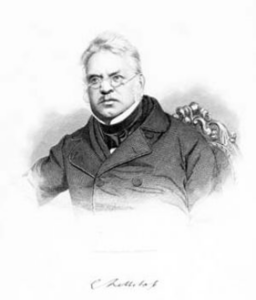Courage for life (Joyful courage for life)
(Poet's title: Lebensmut)
Set by Schubert:
D 937
[summer 1828]
Fröhlicher Lebensmut
Braust in dem raschen Blut,
Sprudelnd und silberhell
Rauschet der Lebensquell.
Doch eh die Stunde flieht,
Ehe der Geist verglüht
Schöpft aus der klaren Flut
Fröhlichen Lebensmut.
Mutigen Sprung gewagt;
Nimmer gewinnt wer zagt;
Schnell ist das Wechselglück,
Dein ist der Augenblick.
Wer keinen Sprung versucht,
Bricht keine süße Frucht,
Auf! Wer das Glück erjagt,
Mutigen Sprung gewagt.
Mutig umarmt den Tod!
Trifft euch sein Machtgebot.
Nehmt euer volles Glas,
Stoßt an sein Stundenglas;
Des Todes Brüderschaft
Öffnet des Lebens Haft.
Neu glänzt ein Morgenrot:
Mutig umarmt den Tod!
Joyful courage for life
Is foaming in the rapid blood;
Fizzing and bright as silver,
The spring of life is burbling.
But before the moment escapes,
Before the spirit dims,
Out of the clear flood create this
Joyful courage for life!
Dare to take the courageous leap;
Those who hesitate never win;
The change of fortune is rapid,
The moment is yours.
Those who do not attempt the leap
Collect no sweet fruit,
Up! Those who are chasing happiness,
Dare to take the courageous leap.
Embrace death courageously
When you encounter his powerful decree.
Take your full glass,
Clink it against his hour glass;
The brotherhood of death
Releases us from life’s imprisonment.
A new dawn is glowing:
Embrace death courageously!
All translations into English that appear on this website, unless otherwise stated, are by Malcolm Wren. You are free to use them on condition that you acknowledge Malcolm Wren as the translator and schubertsong.uk as the source. Unless otherwise stated, the comments and essays that appear after the texts and translations are by Malcolm Wren and are © Copyright.
☙
Themes and images in this text:
Arms and embracing Blood Courage Flying, soaring and gliding Leaping and jumping Morning and morning songs Silver Springs, sources and fountains
Sparkling wine all too soon goes flat. Natural springs that gush from the hillside soon turn into sluggish rivers. These simple facts lead the poet to issue an imperative: seize the moment.
The speaker issues three of these commands: do not delay; dare to leap; embrace death when necessary. We never learn who is being addressed or even who is speaking, but it probably makes sense to conclude that this is an internal monologue. The speaker is summoning up his / her own courage, resolving to take a risk, refusing to be intimidated.
‘Courage’ is one of those qualities that seems to require an input of energy. It does not just flow of its own accord. We do not simply turn a tap so that it flows through us; it is more like working a pump or drilling down so that it can well up with force. When Lady Macbeth was trying to persuade her husband to commit murder she also used an image taken from physical work: ‘screw your courage to the sticking place, and we’ll not fail’ (Shakespeare, Macbeth Act I Scene 7).
That might make some sense of the imagery of gushing fountains or daring leaps, but the cohesion of the text as a whole remains problematic. What sort of courage is it that is needed for ‘life’ itself? Is life lived with courage something different from the ‘life’ most of us experience most of the time? If we need special courage to live so fully, how can this at the same time drive us to embrace death? It is perhaps possible to imagine some situations (e.g. deciding to resist aggression, or taking the side of the weak against the strong) where a willing embrace of death can be interpreted as living a courageous life, but it is not clear that this is what the third strophe is referring to. There is something oddly indulgent about clinking glasses with Father Time’s hour-glass that is not in the spirit of altruistic self-sacrifice. These difficulties might go some way to explaining why Schubert seems to have given up on his setting of the text when he reached the end of the first strophe.
☙
Original Spelling Lebensmuth Fröhlicher Lebensmuth Braust in dem raschen Blut; Sprudelnd und silberhell Rauschet der Lebensquell. Doch eh' die Stunde flieht, Ehe der Geist verglüht, Schöpft aus der klaren Fluth Fröhlichen Lebensmuth! Muthigen Sprung gewagt; Nimmer gewinnt wer zagt; Schnell ist das Wechselglück, Dein ist der Augenblick. Wer keinen Sprung versucht, Bricht keine süße Frucht, Auf! Wer das Glück erjagt, Muthigen Sprung gewagt. Muthig umarmt den Tod, Trifft Euch sein Machtgebot. Nehmt Euer volles Glas, Stoßt an sein Stundenglas; Des Todes Brüderschaft Oeffnet des Lebens Haft. Neu glänzt ein Morgenroth: Muthig umarmt den Tod!
Confirmed by Peter Rastl with Gedichte von Ludwig Rellstab. Erstes Bändchen. Berlin, bei Friedrich Laue. 1827, pages 16-17.
To see an early edition of the text, go to page 16 [32/165] here: http://digital.ub.uni-duesseldorf.de/download/pdf/3376501


